The 2014 World Cup will be the fourth to be hosted by a country that has already had the privilege of doing so, as Brazil try and erase the memories of the tragic loss 64 years ago, when they failed to win the competition for the first time, having to wait eight more years before beginning their dynasty.
Eight different nations have won the World Cup in 19 tournaments: Uruguay, Italy, Germany (as West Germany three times), Brazil, England, Argentina, France and Spain. We have had 15 different hosts over the years, with a few doing it twice: France, Italy, Germany (as West Germany once), Mexico and now Brazil join the club.
1930: Uruguay (Winners and Hosts)
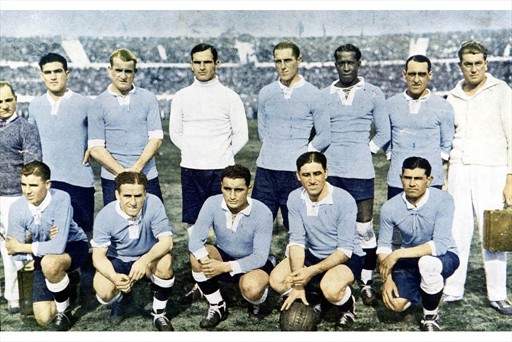
The inaugural World Cup had only 13 teams in it, seven of them coming from South America, while four Europeans (France, Yugoslavia, Belgium and Romania) and two North American (USA and Mexico). The opening match was actually two, as France beat Mexico 4-1 and the United States defeated Belgium 3-0. Lucien Laurent of France scored the first goal in World Cup history.
Uruguay won their two group matches against Peru and Romania before destroying Yugoslavia 6-1 in the semifinals, followed by becoming the first champions in front of 93,000 fans in Montevideo to lift the trophy, beating Argentina 4-2 in the final. Pedro Cea, who scored one of the goals in the final, led Uruguay with five goals, while Guillermo Stabile of Argentina was the tournament’s top scorer.
1934 – Italy (Winners & Hosts)
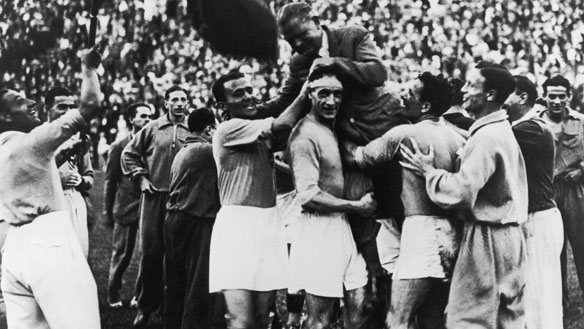
The first time qualifiers were used, with 16 teams making it into the Finals tournament. Just like the 1936 Berlin Olympics, this tournament was used for Political gain by Benito Mussolini and the Fascists regime in Italy. Unlike the 1930 tournament with just one host city, games were played across eight cities, with the final being held in Rome.
There were no group stages – instead a round of 16, quarterfinals, semifinal and final, as Italy went through the United States, Spain (on a replay), Austria in what some consider one of the most corrupt matches of all time and then beating Czechoslovakia 2-1 in the final in extra time. Oldřich Nejedlý of the Czech team was the top scorer, but the winning goal from Angelo Schiavio was the one remembered better than anything else.
1938 – France (Hosts) & Italy (Winners)
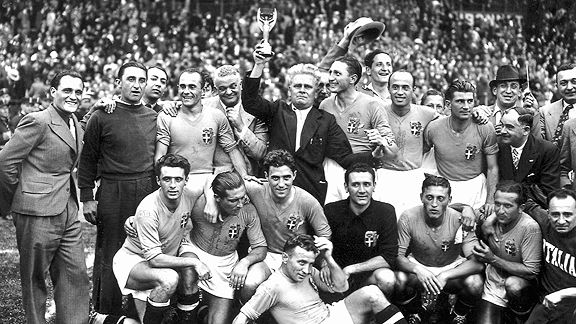
Only 15 teams took part in a World Cup that was preceded with controversy over another European nation being chosen as hosts, with Uruguay and Argentina not competing in the qualifiers as a protest, while Spain weren’t allowed to compete because of the civil war raging on. A year later, the world would be in World War II.
Italy would once again be crowned champions, the first nation to win the competition twice, as they went through Norway, France, Brazil (2-1) in a legendary semifinal and beating Hungary 4-2 in the final, as Silvio Piola and Gino Colaussi each scored twice to win the tournament. Leonidas (not the king) of Brazil led the scoring with 7 goals.
1950 – Brazil (Hosts) & Uruguay (Winners)

After 12 years of waiting, as the 1942 and 1946 tournaments were cancelled due to the World War, Brazil and South America got their World Cup, as only 13 teams from 3 confederations made the journey. Germany and Japan were barred from participating while England made the tournament for the first time.
We had group stages again, and the winner of each group (four of them) advances to final group stage. Brazil, Sweden, Spain and Uruguay made that final group, with Brazil and Uruguay playing on the final day in front of an alleged 200,000 in Rio de Janeiro. Brazil only needed a draw to win, but despite leading 1-0 through Friaça conceded twice from the legs of Juan Alberto Schiaffino and Alcides Ghiggia to give Uruguay their second World Cup victory. Ademir of Brazil was the tournament’s top scorer with 8 goals.
1954 – Switzerland (Hosts) & West Germany (Winners)
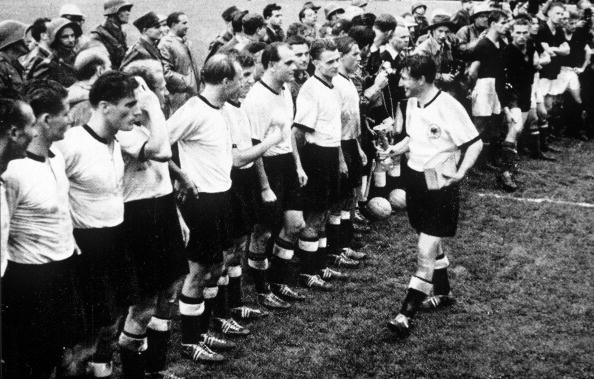
Back to Europe, where Switzerland hosted the competition in six different cities, with 16 teams from four different confederations. The first round was a group stage but with teams playing only two matches instead of three before moving on to a quarterfinal.
The mighty magyars were considered to be the best team in the world and Hungary certainly looked that way with a 9-0 win over South Korea and 8-3 against West Germany. They beat Brazil 4-2 in the quarterfinals and Uruguay 4-2 in the semifinals, but were stunned in the miracle of Bern against West Germany in the final, losing 3-2 despite leading by two goals early on, conceding a winner from Helmut Rahn in the 84th minute. Sandor Kocsis led the tournament with 11 goals.
1958 – Sweden (Hosts) & Brazil (Winners)
(Image via Sportsmole.co.uk)
The great Hungarian team of previous years was in decay, and while it was an impressive run by the hosts, this World Cup belonged to Brazil, finally winning the competition and becoming the first (and only team so far) to win on European soil and not be from Europe.
This was also the moment the world was introduced to Pele, who retired as the greatest footballer of all time but is probably not longer considered that way by most. The 17-year old scored 6 goals in the tournament, including twice against Sweden in the final. Just Fontaine scored 13 goals for France in what is still a record for one tournament.
1962 – Chile (Hosts) & Brazil (Winners)
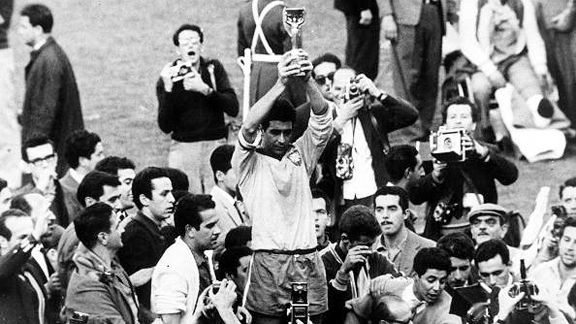
The 1962 FIFA World Cup was the first World Cup that used goal average as a means of separating teams with the same amount of points. This was also the first World Cup in which the goal average per match dropped below 3 (2.78) and has never reached 3 again. While Brazil handled Pele’s injury very well to defend their title (the last team to do so) by beating Czechoslovakia 3-1 in the final, the most memorable match in this tournament happened in the group stage between Italy and Chile.
The Battle of Santiago which Chile won 2-0. Referee Ken Aston did a terrible job in terms of fairness, sending off two Italian players while allowing the Chileans to pretty much beat up their rivals, as police forces had to intervene between players four times during the match. BBC sports commentator David Coleman described the match as the most stupid, appalling, disgusting and disgraceful exhibition of football, possibly in the history of the game.
1966 – England (Hosts & Winners)
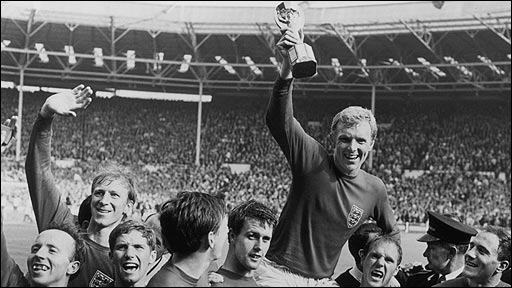
We had 16 teams from 5 confederations in the 1966 World Cup, as England won for their first and only time, also making the final for the first time. Eusebio reached legendary status with 9 goals, taking Portugal to the semifinal, Lev Yashin was huge for the Soviet Union until the semifinal and Brazil didn’t even make it out of the group stage.
England beat West Germany 4-2 in the final with that legendary goal that did or did not go in (no goal line technology, you know) by Geoff Hurst, who also scored a hat trick in the final to give Bobby Moore a chance to lift the trophy.
1970 – Mexico (Hosts) & Brazil (Winners)
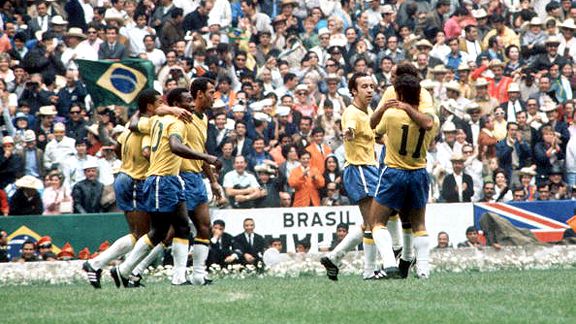
This was the crowning moment of Brazilian dominance of that era, winning a third World Cup (being the first to do it) in four tournaments, with Pele winning his third as well. Brazil kept the Jules Rimet Trophy after beating two-time champions Italy in the final 4-1.
The Brazilian side is considered the greatest ever in the World Cup, going perfect in the qualifying and through the World Cup, including England, Czechoslovakia and Uruguay before beating the Italians in the final, which was held outside Europe or South America for the first time in the tournament’s history.
1974 – West Germany (Hosts & Winners)
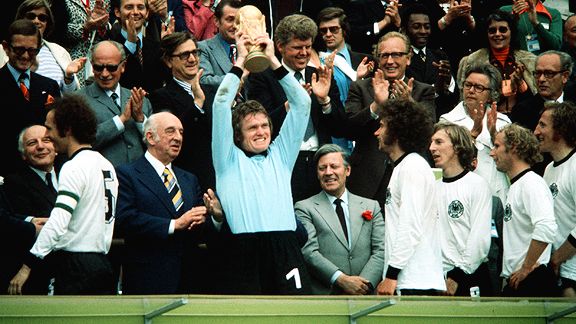
A new trophy as West Germany joined the group of nations with two World Cup titles. They lost to East Germany in the group stage and almost didn’t make the next stage, as the tournament moves into a different format, with a two-group second round with four teams in each group, as the winner of each group went to the final.
Leaving Poland behind, West Germany went on to meet the favorite Dutch team with Cruyff in the final, winning 2-1 despite going down to a Johan Neeskens penalty. Paul Breitner and Gerd Muller scored to seal the title, while Grzegorz Lato of Poland led the scoring with 7 goals.
1978 – Argentina (Hosts & Winners)
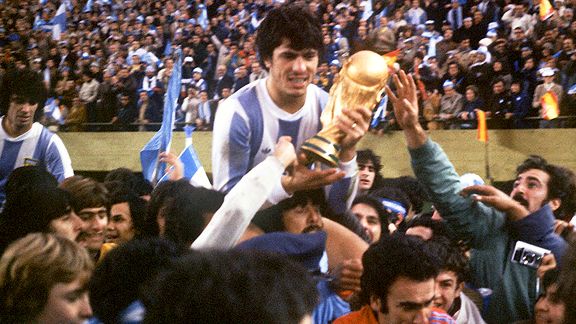
Not the most Kosher of World Cups because of the Dictatorship in Argentina, with the host nation getting to play at night time, knowing what results they needed. In the second group stage, Argentina beat Peru 6-0 in a highly disputed resulted to leave Brazil behind on goal difference and make the final.
In the final, a Cruyff-less Dutch team managed to force overtime with a late goal from Dick Nanninga, but Mario Kempes scored his second goal of the match to make Argentina world champions for the first time, and also clinch the scoring title of the tournament with six.
1982 – Spain (Hosts) & Italy (Winners)
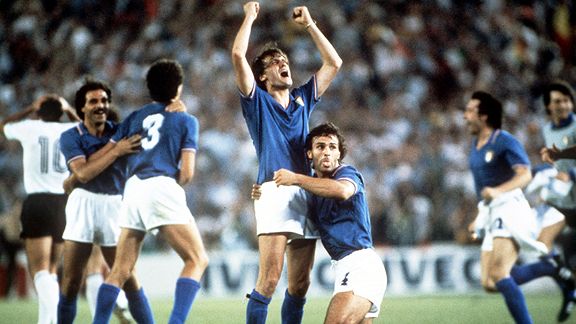
This was the beginning of opening up to Asia and Africa, as the tournament moved into a 24-team with format, giving us a group stage followed by a four-match knockout stage: Round of 16, quarterfinals, semifinals and final.
Italy went on to win for the third time (after a 44-year wait), which included beating Brazil 3-2 in the second round, widely considered the greatest match in World Cup history. Italy beat West Germany 3-1 in the final as Paolo Rossi scored again, finishing the tournament with six goals, more than anyone else.
1986 – Mexico (Hosts) & Argentina (Winners)

Colombia had been originally chosen to host the competition by FIFA but, largely due to economic reasons, was not able to do so and officially resigned in 1982. Mexico was selected as the new host in May 1983, as Mexico became the first nation to host the tournament twice.
This was the defining month of the Diego Maradona legend, leading a less than impressive Argentina side to their second World Cup title, scoring 5 goals along the way. He scored twice in five minutes against England in the quarterfinals – one with his hand and one that is the popular choice for greatest goal in World Cup history, while not scoring in the final against West Germany, relying on teammates Jose Luis Brown, Jorge Valdano and Jorge Burruchaga to win 3-2 in front of 115,000 at the Azteca stadium.
1990 – Italy (Hosts) & West Germany (Winners)
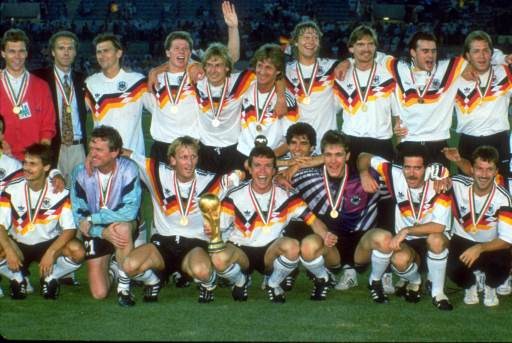
The 1990 FIFA World Cup was the first World Cup that was officially recorded and transmitted in HDTV by the Italian broadcaster RAI in association with the Japanese NHK broadcaster. However, it isn’t remembered fondly by pretty much anyone. Only 2.21 goals per game, 16 red cards through the tournament and the first ever sending off in the final.
Italy finished third, losing to Argentina in the semifinal on penalty kicks as many cheered Maradona in Napoli instead of the host nation. West Germany beat Argentina 1-0 with a controversial penalty kick to claim their third title, appearing in split form for the final time. Salvatore Schillaci was the leading scorer with six goals.
1994 – United States (Hosts) & Brazil (Winners)
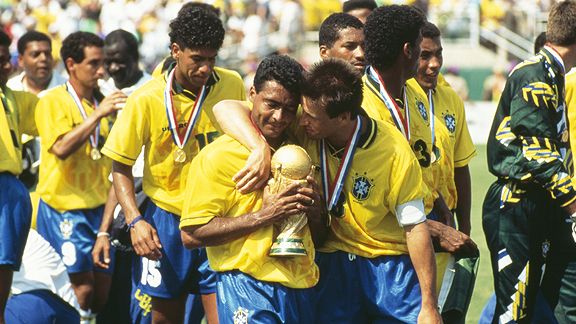
The World Cup that was supposed to bring football, or soccer, to North America. It was a nice change after the dimness of Italy, with bigger stadiums and more fans than ever, as the 3.6 million for the final tournament remains the highest in World Cup history despite being a 24-team tournament.
The hosts somehow made the second round but lost to Brazil, while a different, more European and pragmatic in style Brazilian team, led by Romario with 5 goals, beat Italy in the final after a penalty shootout, made famous by the Roberto Baggio miss after an incredible knockout stage from the Italian legend.
1998 – France (Hosts & Winners)
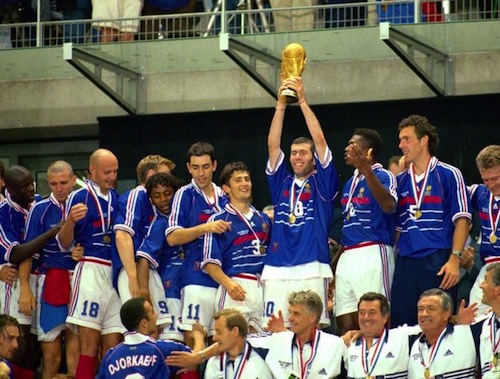
A move to a 32-team format with some excellent football along the way with some very memorable matches, like Nigeria beating Spain 3-2 in the group stage, Argentina beating England after a 2-2 draw through 120 minutes in a penalty shootout, and the Netherlands beating Argentina in the quarterfinals.
Brazil met France in the final, with legends and myths built around Ronaldo’s collapse in the dressing room prior to the match. Zinedine Zidane scored twice off of corner kicks to lead France to their first World Cup victory, beating Brazil 3-0 in the final. Davor Suker of Croatia led the scoring with six goals.
2002 – Japan & South Korea (Hosts) & Brazil (Winners)
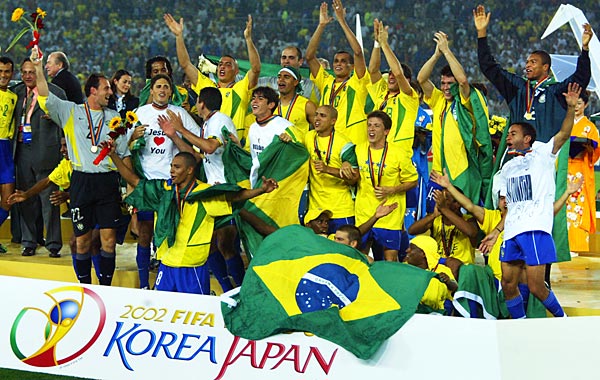
The first split nation World Cup and also the first one hosted in Asia, with Seoul hosting the opening match (Senegal stunning France) and Tokyo hosting the final. South Korea made the semifinal, beating Italy and Spain along the way with some horrific officiating to help them through against much better sides.
Brazil reached the final, as expected, against a very surprising Germany team coming off two very disappointing tournaments. Ronaldo scored twice to finish with 8 goals, leading the scoring in the tournament and leading his nation to their fifth World Cup, two more than anyone else at the time.
2006 – Germany (Hosts) & Italy (Winners)
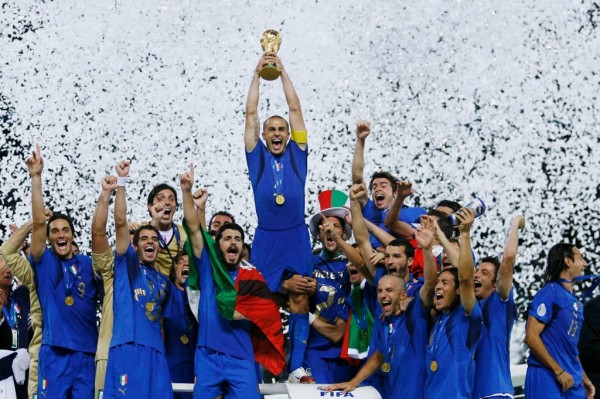
Germany hosted the tournament for the first time as a unified nation, presenting a much more attractive brand of football than previous German sides, which was enough to reach the semifinals, losing to Italy in extra time.
The Italians made their first World Cup Final since 1982, beating France in a penalty shootout after a 1-1 draw through the 120 minutes, becoming only the second nation to win the competition four times or more. With 5 goals, Miroslav Klose of Germany was the top scorer.
2010 – South Africa (Hosts) & Spain (Winners)
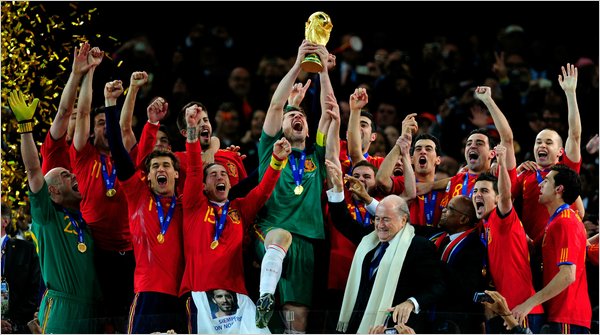
The first World Cup hosted in Africa, although South Africa were the first hosts to fail making it out of the group stage. Brazil once again didn’t make it past the quarterfinals, this time losing to the Netherlands while France and Italy failed to make it out of the group stage.
In the final, the favorite Spanish side beat the Netherlands 1-0 with Andres Iniesta becoming a national hero in extra time after one of the more brutal matches in tournament history, as Howard Webb did an awful job of calming things down, using 14 yellow cards and one red to the Dutch. It was the first time a European nation won the competition off of European soil.
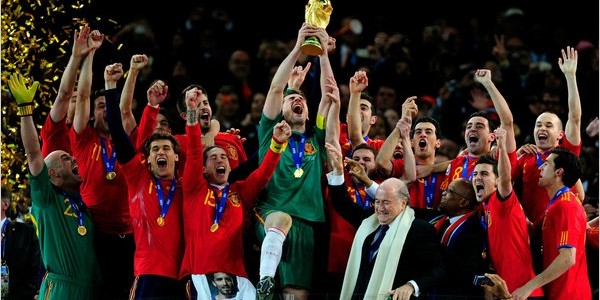
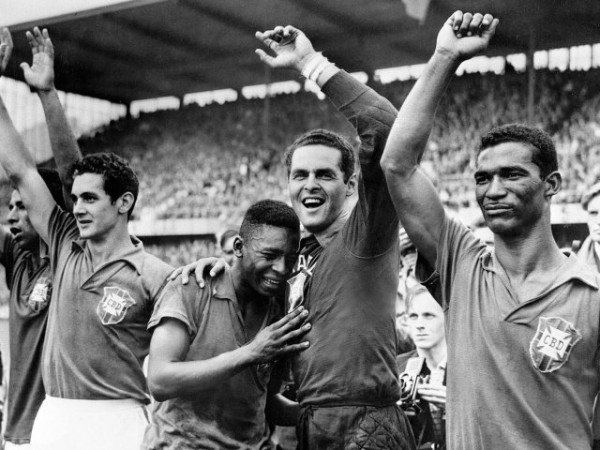
One response to “The History of World Cup Winners & Hosts”
[…] The History of World Cup Winners & Hosts | Sportige http://sportige.com/Eight different nations have won the World Cup in 19 tournaments: Uruguay, Italy, Germany (as West Germany three times), Brazil, England, Argentina, France and Spain. We have had 15 different hosts over the years, with a … […]